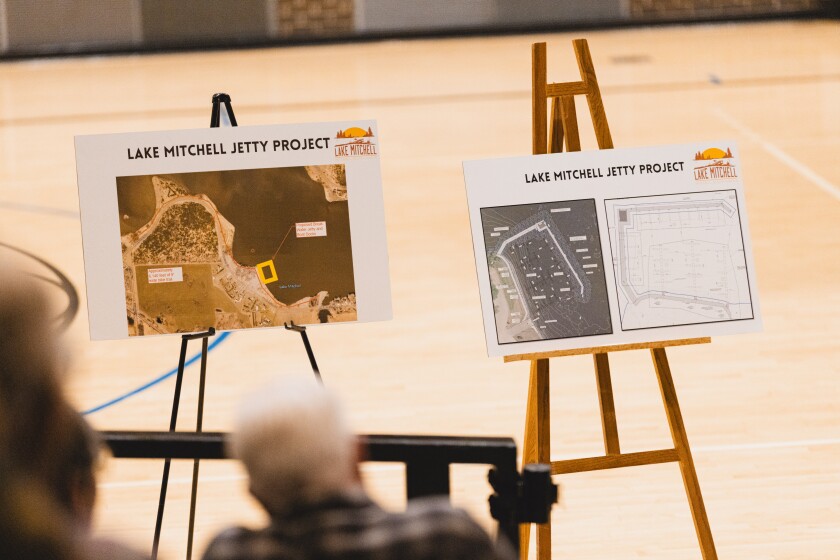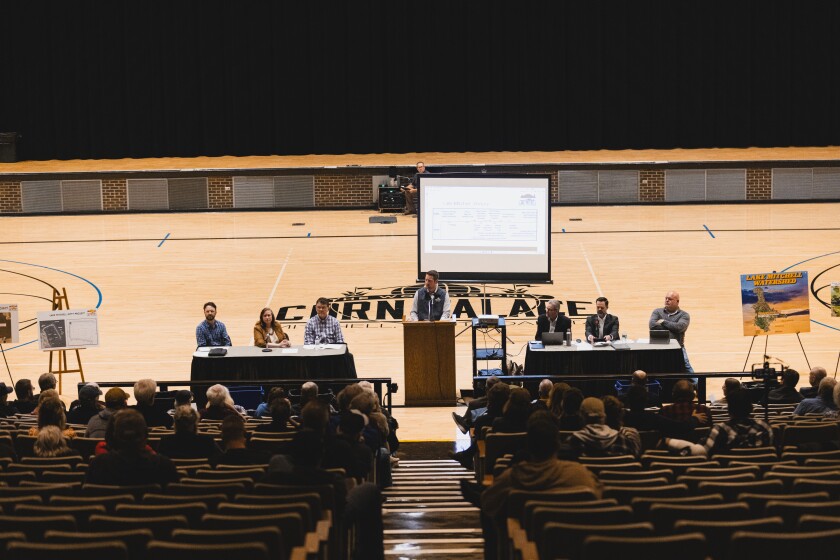
Posted on March 25, 2024
Who will be responsible for repairing a property owner’s retaining wall if destroyed due to the drawdown of the lake? How much will it cost the city to restock Lake Mitchell with fish following a dredging project? How will the city determine whether a dredging project was deemed a success?
Those were among the wave of questions Mitchell residents asked city officials and engineers who created the Lake Mitchell dredging project design that the city is pursuing.
After presenting an in-depth rundown of the proposed $25 million mechanical dredging project, officials with Barr Engineering and Houston Engineering (formerly known as Fyra Engineering), along with Public Works Director Joe Schroeder and a Game, Fish and Parks official offered residents an opportunity to ask questions about the project during Tuesday’s Lake Mitchell informational meeting.
If the $16.8 million loan to fund the proposed mechanical dredging project is approved by voters on June 4, it would require the city to drawdown the lake water for crews to remove soft sediment along the lake bottom. Project leaders previously explained to the Mitchell City Council that mechanically dredging the lake would result in a fish kill, however, the Game, Fish and Parks has agreed to restock Lake Mitchell with fish.
A resident in the audience asked how much it would cost the city to have the lake restocked with fish?
Dave Lucchesi, area fisheries supervisor for the southeast portion of the state with the South Dakota Game, Fish and Parks, said the city would not be responsible for paying the GF&P to restock the lake.

Signs of the Lake Mitchell jetty project are set up on display at the Lake Mitchell information meeting on Tuesday, March 19, 2024, at the Corn Palace.
“We would come in and stock the lake with a variety of fish that were already in there as soon as it was ready. There would be no additional costs to the city of Mitchell,” he said.
Stewart Hanson, a Mitchell resident who has expressed his opposition to the proposed dredging, asked whether the city would be responsible for repairing a property owner’s retaining wall in the event it were destroyed due to the drawdown of the lake.
Public Works Director Joe Schroeder said the affected property owner would not be responsible for paying to repair a damaged retaining wall, confirming the city would ultimately be responsible for the repair work.
Eric Lund, a project leader with Barr Engineering, added that the lake drawdown would be done in a gradual manner to avoid damaging retaining walls along lake properties.
Mayoral candidate Jordan Hanson asked if Mitchell residents can expect to see a 50% algae bloom frequency following a $25 million mechanical dredging project, which was cited by engineers who developed the concept of dredging the lake.
“The 50% bloom frequency is based on equations that were established a couple decades ago to try and measure what level of phosphorus in the water column might result in a reduction. Making a specific prediction of algae frequency is a very difficult question to answer. The work that the city has and the work that Fyra has done should make a significant reduction (in algae),” Lund said.
Mike Sotak, an engineer with Houston Engineering, added the proposed dredging project, along with continued work in the Firesteel watershed, would produce a “drastic improvement.”
“Without continued work in the watershed and in the lake, that drastic improvement is going to be short-lived. There is the long-term application to this as well,” Sotak said, noting the city’s been making solid progress on working in the Firesteel watershed.
Don Everson, a Mitchell City Council candidate running for Ward 4, asked if the actual cost of the proposed dredging project, including interest and $500,000 annual alum treatments over a 30-year period, is upward of around $50 million.
According to the cost breakdown of the mechanical dredging project that was presented to Mitchell City Council, the total cost of the dredging project could be around $50 million with 30 years of annual interest payments attached to the $16.8 million loan and $500,000 annual maintenance over a 30-year span. The dredging project itself, which includes the $3.5 million drawdown structure, is estimated to cost $25 million.
In response, City Administrator Stephanie Ellwein explained the $500,000 annual maintenance costs that were included on the cost breakdown of the project during recent budget discussions was an estimate.
“The $500,000 a year was just a budget number we used so that the council was aware that even after the project is done, you have to maintain the water coming into the lake. It could be less depending on what the runoff is doing each year,” Ellwein said.

Mitchell’s Joe Schroeder speaks to the crowd at the Lake Mitchell information meeting on Tuesday, March 19, 2024, at the Corn Palace.
Joe Kippes, a leader of Friends of Firesteel who has been heavily involved in numerous groups and committees focused on reducing the algae woes, went through a list of past attempts that were made to improve the lake’s ailing water quality.
From the SolarBee water stirring machine to algaecide applications, Kippes explained the past smaller-scale projects have not produced the intended results. He pointed to the mechanical dredging project that’s on the table as an option Lake Mitchell desperately needs.
Paula Mazzer, a Dakota Wesleyan University biochemistry professor, took part in the meeting and claimed the only methods to remove the phosphates from the water column is through removing soft sediment along the lake bottom and alum treatments.
“We have 10.5 tons of easily dissolvable phosphates sitting on the bottom of our lake. If we were to mineralize it all with alum, it would take an awful lot of alum. We think the only other way to get rid of it is to go in and scoop it out,” Mazzer said.
To open the meeting, Jeff Logan, the emcee, targeted the argument that a Lake Mitchell improvement project only benefits lake property owners who use the body of water more frequently.
“The lake was built by the people of Mitchell and for the people of Mitchell. Lake Mitchell is truly a lake for everyone,” Logan said.





